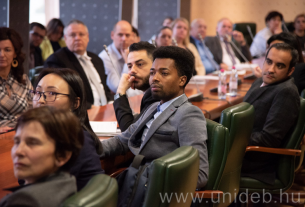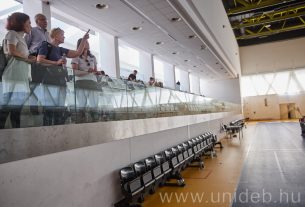“With this declaration of intent, our purpose is to upgrade the cooperation between the University of Debrecen and ATOMKI (short name for the institute), which looks back on a history of 18 years. This fall, we are going to start to establish a proton therapy institute, for the operation of which we will need a significant background in the fields of nuclear physics in addition to the one in medicine. Besides, through connecting basic (fundamental) research and innovation, we will be receiving tasks from our partners that the experts from the university and from the Institute of Nuclear Research will be able to work on and complete together,” said Zoltán Szilvássy, Rector of the University of Debrecen, at the press conference held on August 1.
The rector also added that, by connecting fundamental research and innovation, an innovational chain would be established, which would then also facilitate increasing the competitiveness of the industry.
“The Institute of Nuclear Research in Debrecen has been in a virtual “symbiosis” with the university ever since its foundation 65 years ago. We continue to work in close professional relationship and cooperation with the Faculty of Informatics, the Faculty of Science and Technology, and the Faculty of Agriculture, as well as several doctoral schools. We also train PhD students and contribute to educational programs. As the basic task of our institute is to pursue nuclear research, we will devote our entire professional expertise to help accomplish the newly specified objectives,” said Zsolt Dombrádi, Director of ATOMKI.
Zoltán Bács, the Chancellor of our university, regards it a significant step forward that a research institute of the academy launches applied research projects in addition to the fundamental ones in cooperation with a university and the relevant representatives of the industry in order to find solutions to problems faced by individual companies. As an example, he mentioned the fact that there had been research projects in the field of material sciences conducted at ATOMKI that would yield findings useful for the automotive industry.
“The agreement in the form of a declaration of intent that we have signed today may open a new phase of cooperation through joint workshop services, the development of a national nuclear physics laboratory, and the expansion of the services rendered by the university innovation system,” added Zoltán Bács. At the same time, the chancellor also reckons that the appearance of the academic achievement of research institutes of the academy in higher education rankings might even improve international acknowledgment through double affiliation.
During the past year, the University of Debrecen has signed a number of strategic agreements of cooperation with major corporations of the energy sector, including, for example, Ganz vállalatcsoport [Ganz Engineering & Energetics]. For the major representatives of industry, research activities of high efficiency seem to be of vital importance.
“The cooperation and joint projects of the University of Debrecen and the Institute of Nuclear Research in Debrecen offer an extraordinary possibility for solving the problems encountered by Ganz Engineering in the fields of materials science, nuclear physics and energetics, while it also exerts significant influence on the competitiveness of the corporate group,” said Attila Szitár-Csanádi, the Director of a Rosatom’s affiliation in Hungary. The director underlined that the symbiosis of the university and the research institute of the academy would be really forward-looking from the aspect of the potential effectiveness of research and development. The same kind of combination has proved to be powerful in examples abroad, where research institutes related to the academies in a system similar to the Hungarian one have been connected to major universities, for example in Russia. Attila Szitár-Csanádi also mentioned that the efficiency of the less-than-a-year-old relationship with the University of Debrecen could already be demonstrated: a short while ago, for example, a materials-related problem in a nuclear power plant located in India could be taken care of in not more than three days.
“In Debrecen, something entirely new is being born, which can help in accomplishing the objectives set for the year 2030. A decisive issue in this respect is to what extent the scientific findings and developments can become organic parts of the operation of companies. For facilitating this process, we need to build a ‘bridge of knowledge’ between enterprises capable of innovation and the scientific background because we can only proceed with the help of such a cooperation,” said Ferenc Miklóssy, the President of Hajdú-Bihar Megyei Kereskedelmi és Iparkamara [Chamber of Commerce and Industry of Hajdú-Bihar County] .
At the Wednesday press event, the rector of UD said in response to a question asked by journalists that, in Debrecen, he saw the partnership and cooperation between the university and the institute of the academy to be a lot smoother than anywhere else. He added that the academy sometimes causes uncertainties in the operation of the universities through the degrees and titles its grants and also through the advice it sends to the government. As an example, Zoltán Szilvássy mentioned the issue of separating the faculties of medicine from universities and the question of the degree MTA doktora [doctor of the Academy of Sciences], which is an external title but positions at universities might also be related to it (for example, in doctoral schools).
Press Office, unideb.hu


















